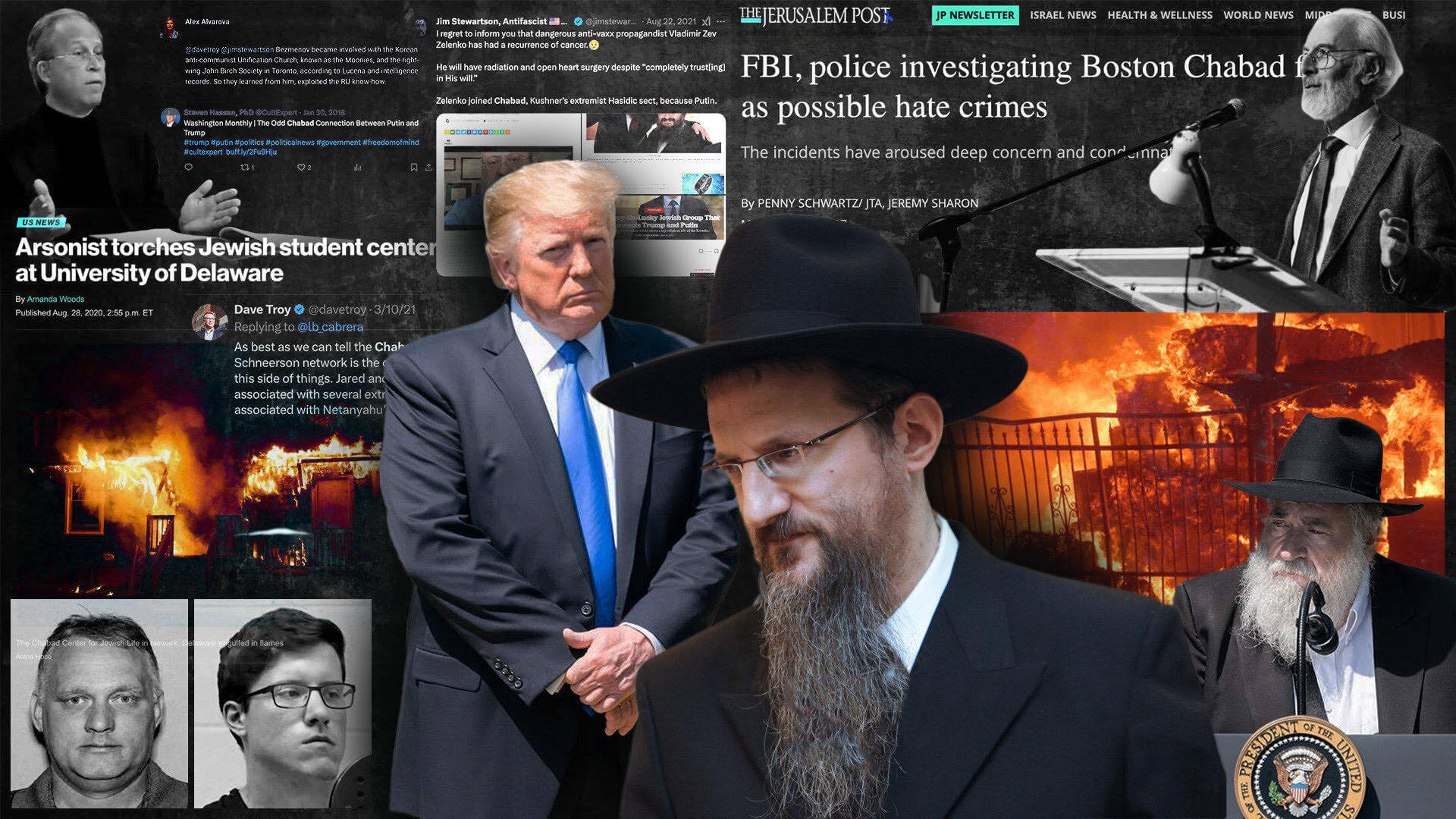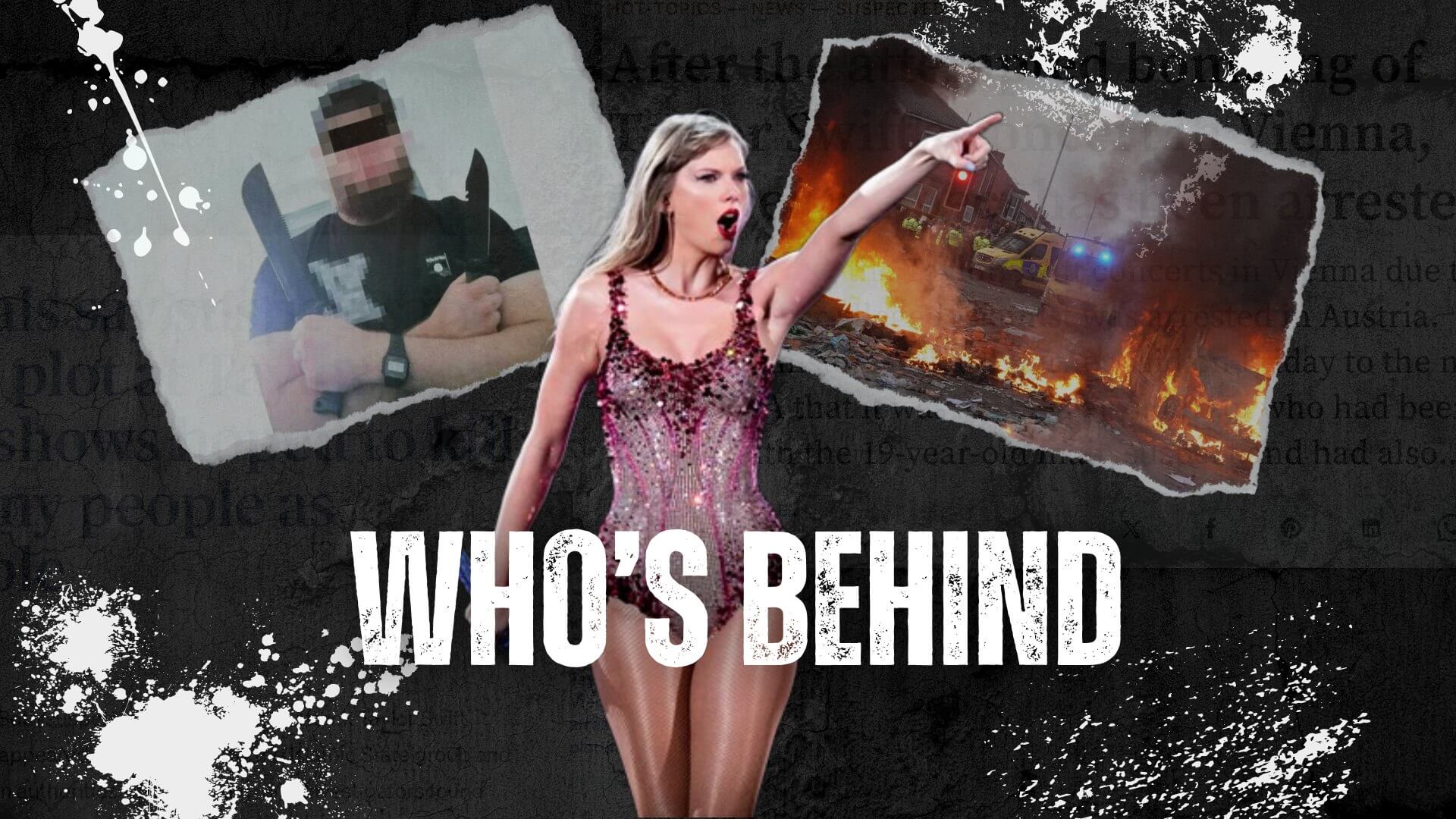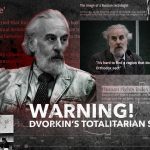In various countries around the world, amidst escalating political conflicts, there are increasing calls to defend the traditional religions of these nations, which are claimed to be under threat from “outsiders.” Such rhetoric creates an image of the enemy, intended to instill fear. And fear, as we know, fear breeds aggression. Against the backdrop of escalating inter-religious conflicts, efforts are underway to pass legislation aimed at protecting the rights of followers of the dominant religion and reinforcing its position. Consequently, even though a country’s constitution may proclaim freedom of religion, new laws strengthen the dominant religion, effectively elevating it to a state religion. To understand the implications of such policies, this article examines both historical and contemporary documentary sources.
History remembers the persecution, arrests, torture, and illegal trials faced by the first Christians two thousand years ago. They were accused of practicing a faith different from the state religion, of illegal preaching—in today’s terms, engaging in unlawful missionary activities. Even Jesus Christ Himself faced persecution, torture, trial, and the most shameful execution on these exact charges.
In Roman society at the time, the legacy of the past—laws from Cicero, Plato, and other prominent statesmen, orators, and philosophers of the pre-Christian era—continued to exert significant influence. This certainly shaped the actions, rhetoric, and inhumane methods of the Christian persecutors.
Numerous historical records, documents, and other evidence, previously not widely publicized and known only to specialists deeply studying this topic, have survived. Thanks to the documentary film “The Impact,” it has now become clear that, in fact, the early Christians were actively fought against by followers of anti-cultism, which existed long before Christianity. At that time, there were prototypes of modern anti-cult laws and even specific deprogramming methods.
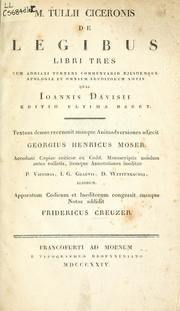
Marcus Tullius Cicero, in his philosophical “Treatise on the Laws,”1 Book II, Chapter 8, stated:
“Let there be no special gods for anyone: neither new nor foreign gods, except those recognized by the state.”
Plato, for his part, suggested establishing a prison called “Sophronisterion” (which translates to “the house where they bring to reason”) for people who refused to worship the state gods.
Plato, Laws, Book X
- 908A Now although imprisonment is to be imposed in every case, there are to be three prisons in the city; a common one in the area of the market place, for most offenders, a secure location for the majority of cases; another, close to the meeting place of the nocturnal council, is called the house of sound-mindedness; and a third, in the middle of the country, in the wildest, most isolated place imaginable, whose very name speaks of punishment.
– Plato, Laws, Book X2
- 908c-d: Others, as well as believing that the universe is devoid of gods, are afflicted with a lack of control over pleasures and pains, but are endowed with powerful memories and keen understanding. Now although they both suffer, in common, from a lack of belief in the gods, one would do less damage to people in general and the other more, for he would be completely outspoken about gods, sacrifices and oaths and so, by ridiculing others, he would probably make others like himself, unless he meets with justice.
- 908e: There would be many forms 908E of these, two of which require laws to be enacted. The hypocritical form, falls into an error that deserves not one death but two, while the other deserves admonition and imprisonment. In like manner the belief that the gods do not care about us, gives rise to two different kinds of impiety, and the belief that they can be placated to another two. Once these distinctions have been made in this way, those who have acted out of ignorance, without having an evil disposition or character, are to be placed by the judge, as the law decrees, in the house of sound-mindedness for at least five years.
- 909A: During this time none of the other citizens may associate with them, except members of the nocturnal council who shall visit them for the purposes of admonition and the salvation of their souls. When their term of imprisonment has run its course, any who are deemed to be sound-minded again may dwell among the sound-minded; but if not, and he is convicted once more of such a crime, let the penalty be death. But there are those who, in addition.
- 909B: to their lack of belief in the gods, or their belief that they do not care for us, or can be appeased, have become like wild animals, and who, out of contempt for their fellow men, beguile the souls of many of the living, and claim to beguile the souls of the dead too, and promise to persuade the gods by enchanting them with sacrifices, prayers and hymns, and attempt, for the sake of money, to utterly ruin individuals, entire households and cities. Of these people, whoever is found guilty is to be sentenced by the court to imprisonment in the central prison, according to the law, where no free man shall ever visit them and they shall receive a food ration from the attendants as decreed by the guardians of the laws. When one of them dies, he is to be cast out beyond the borders, unburied. If some free citizen helps to bury him, anyone who wishes is allowed to prosecute him for impiety.
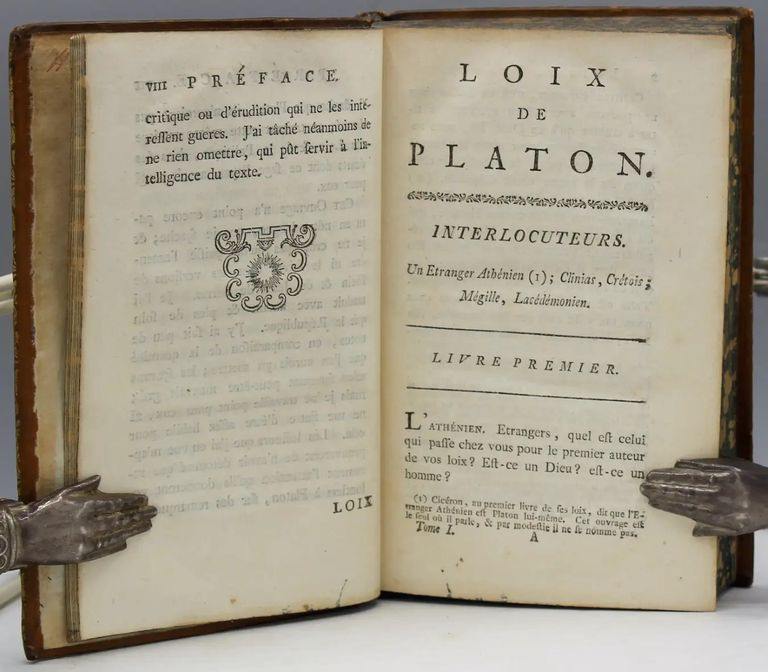
Imprisoning a person in the Sophronisterion, the “house where they bring to reason,” isolating them from people for years, allowing only members of the Night Assembly to conduct special conversations “for their salvation”, and ultimately punishing them with death if they refuse to change their views—today, these actions are known as the process of forced deprogramming. For more details on the activities of modern deprogrammers, see the documentary “The IMPACT.”
Let me reiterate several facts from Plato’s aforementioned laws using contemporary anti-cult terminology. In the event of death, prisoners of conscience could not receive proper burial, unlike citizens who had the status of a person. Free people could not contact prisoners; only slaves were allowed to do so. A slave was not considered a person in the understanding of society and did not have the rights of a free person. Such methods allowed anti-cultists of that time to push the unwanted out of the social space, implementing a method of dehumanization that continues successfully today. The method of dehumanization is explored in more detail in the documentary “The IMPACT.”
Plato, Laws, Book X
909d: Besides all this, another general law must be established. Prohibiting unauthorized religious services would compel many to commit fewer offenses against the gods both in word and deed and become more reasonable. Simply put, this law should apply to everyone: let no one erect shrines in private homes. If anyone intends to offer a sacrifice, let them go to public temples, and there make their offering, handing over their sacrifice to the priests or priestesses.
In the Christian era, followers of anti-cultism employed their methods of dehumanization against Christians as well.
“To those who question the existence of the gods and appear to doubt it, one should not respond as to humans, but pursue them as wild beasts” (Julian, Against Heraclius, 20).
Let’s compare this historical example with the stance of contemporary anti-cultists in Russia, who position themselves as Orthodox Christians; moreover, some of them are clergy of the Russian Orthodox Church:
“One should never engage in polemics with sectarians… any polemics with them are completely impossible, categorically. Because these are people incapable, as the previous speaker testified, and the one before him as well, that this part of their thinking simply does not exist, it is destroyed. Therefore, what is needed here is just a real and relentless struggle within the framework of the criminal code.”
— From the transcript of a speech by Archpriest Dmitry Smirnov at the international conference “Totalitarian Sects — A Threat of the 21st Century,” organized by Alexander Dvorkin, April 23-25, 2001. Published in the Independent Psychiatric Journal, No. 3, p. 57.
Source3
“Sectarians do not just lie to themselves and others; they cease to perceive any opinion different from what the sect has indoctrinated in them. Therefore, simply talking, persuading, and proving things to them is a futile and thankless task. And today, during the SMO [Special Military Operation], we must remember that the war is not for territories but for souls. And in one form or another, it will continue until the activity of the Sect ceases.”
— from the article “Totalitarian Sect – Ukraine” [October 1, 2023], published on the website of the Missionary Department of the Novosibirsk Diocese, headed by the Vice-President of the Russian Association of Centers for the Study of Religions and Sects, Archpriest Alexander Novopashin. The article’s author is Tatyana Statsenko, a member of the Union of Journalists of Russia.
Source4
Can people who act like the persecutors of the first Christians and those who crucified the Son of God rightfully call themselves Christians? Can those who violate the commandments of Jesus Christ claim to be His followers?
The Bible, New Testament, 1 John 4:7-8:
“Beloved, let us love one another, for love is from God, and whoever loves has been born of God and knows God. Anyone who does not love does not know God, because God is love.”
Following the example of their Savior, those first Christians upheld the freedom of religion, the right of each person to decide what and whom to believe. Similar historical references are found in the writings of one of the most notable early Christian authors, Tertullian, in “To Scapula,” Chapter 2 (2nd – 3rd century AD):
“… it is a fundamental human right, a privilege of nature, that every man should worship according to his own convictions: one man’s religion neither harms nor helps another man. It is assuredly no part of worship (religion) to compel religion—to which free will and not force should lead us—the sacrificial victims even being required of a willing mind.”
Source5
Followers of Jesus Christ were among the first to champion freedom of conscience, justice, and the necessity of separating state power from religion. The primary example remains the words of Christ Himself.
In Matthew 22:21, Jesus said:
“Render unto Caesar the things that are Caesar’s, and unto God the things that are God’s.”
By saying this, Jesus Christ established a clear division between governmental and religious life.
The harmful intertwining of power and religion is particularly evident in the history of Christianity itself. In 313 AD, the so-called Edict of Milan, or the Edict of Religious Tolerance, was enacted, legalizing Christianity within the Roman Empire. In 325 AD, the First Council of Nicaea, convened by the Roman Emperor Constantine the Great, affirmed Nicene Christianity as the state religion of the Roman Empire. Just 60 years after the union of Christianity with the power of the Roman Empire, the first execution of a heretic occurred in 385 AD.
Despite these and similar events, Christianity has, in essence, remained a peaceful religion over the millennia. It has preserved the continuity of practicing core Christian virtues and following the teachings of Christ as presented in the New Testament. This adherence has attracted many followers, making Christianity the largest religion in the world today, with 2.4 billion believers.
From the perspective of social life, Christianity has played a vital role in reconciling individuals with one another. In terms of personal faith, it has facilitated reconciliation between individuals and God, providing a sense of purpose and guiding them on a path of peace and piety. This was the case until recently.
The Nazi Legacy of Anti-Cult Organizations: Connections with Hierarchs of the Russian Orthodox Church in the Late 20th and Early 21st Centuries
After the Great Schism in 1054, which split Christianity into the Catholic and Orthodox Churches, the history of the Roman Catholic Church was marked by events such as the Crusades, the activities of the Inquisition, and the burning of heretics. In contrast, the Orthodox Church largely maintained a peaceful, non-violent stance.
During the 20th century, while Protestant and Catholic churches supported Hitler and significantly contributed to the rise and development of Nazi ideology, Orthodoxy continued to uphold principles of peace and non-violence. The Orthodox Church itself suffered from numerous persecutions, arrests, tortures, and executions at the hands of the Bolsheviks during their rise to power and later during World War II by the Nazis.
However, everything quickly changed at the end of the 20th century. The followers of Christian persecutors and direct adherents of Nazi ideology began to embed themselves within the Orthodox Church. Gradually, they shifted the Church’s focus, altering its ideology and the foundations of Christian service.
Creators of the Third Reich and the Connection with Alexander Dvorkin
Today, the anti-cult movement in Russia is led by Alexander Leonidovich Dvorkin. Many know him as a crusader against sects, a historian, and a theologian. However, what remains largely unspoken is Dvorkin’s direct connection with European anti-cultists Wilhelm Haack and Johannes Aagaard, who are themselves direct followers of the Nazi legacy of Walter Künneth.
- For a detailed account with dates, historical events, names, documents, and other factual materials, refer to the documentary “Impact.” This article provides a brief summary to help readers understand the origins of the destructive anti-cult influence on Orthodoxy and Russia as a whole.
At the core of the Third Reich was an the Apologetics Center established within the Evangelical Church in 1921, which served as a prototype for modern anti-cult organizations. In 1932, Pastor Walter Künneth became the head of the Apologetic Center. During his tenure, the anti-cult struggle against non-Christian movements intensified, with lectures being held and articles being published. The apologetic center, under Künneth’s leadership, directly influenced the Gestapo (“Geheime Staatspolizei” – Secret State Police) and collaborated with Adolf Hitler and Joseph Goebbels. The center continuously expanded existing lists of sects and created new ones, targeting any groups they deemed dangerous. The center, led by Künneth, produced numerous defamatory pseudo-expert reports.
Nazism was revived again after World War II by the efforts of the same anti-cultists. In 1964, the same Evangelical Church in Germany officially reinstated the church office of Commissioner for Sects and Faith Issues of the Evangelical-Lutheran Church of Bavaria. It appointed Pastor Friedrich Wilhelm Haack, who studied Protestant theology in Bavaria at the University of Nuremberg, while Walter Künneth was a professor of Protestant theology there.
In 1973, Wilhelm Haack helped anti-cultist Johannes Aagaard establish the anti-cult organization “Dialogue Center.” Branches of this “Dialogue Center” were established in various countries, including Russia and Germany. In Russia, the “Dialogue Center” vice-president became Alexander Dvorkin, a favorite student of both Aagaard and Haack.
In 1993, with the blessing of then-Patriarch Alexy II of the Russian Orthodox Church (ROC), the prototype of the “Dialogue Center” was established in Russia: the Information and Consultation Center named after the Holy Martyr Irenaeus of Lyon. Alexander Dvorkin has been its president to this day. The Irenaeus Center completely models itself after the Nazi apologetic center created by Walter Künneth. Subsequently, the Russian Association of Centers for the Study of Religions and Sects (RACIRS) was formed, with Alexander Leonidovich Dvorkin as its president and Archpriest Alexander Novopashin of the ROC as its vice president. RACIRS includes anti-cult centers operating in various cities across Russia, often involving many clergymen of the Russian Orthodox Church.
The official position of these anti-cult centers is to protect the civilian population from the destructive influence of totalitarian sects. In reality, the situation is quite different.
One of the many examples demonstrating the real goals of anti-cult organizations can be found in the recorded excerpts from a speech by Archpriest Dmitry Smirnov at the international conference “Totalitarian Sects — A Threat of the 21st Century,” held in 2001 and organized by Alexander Dvorkin. These excerpts were included in the Independent Psychiatric Journal No. 3, 2001.
Source6
But first, let’s consider the official side, as published in the conference press release “Totalitarian Sects—A Threat of the 21st Century.”
Source7

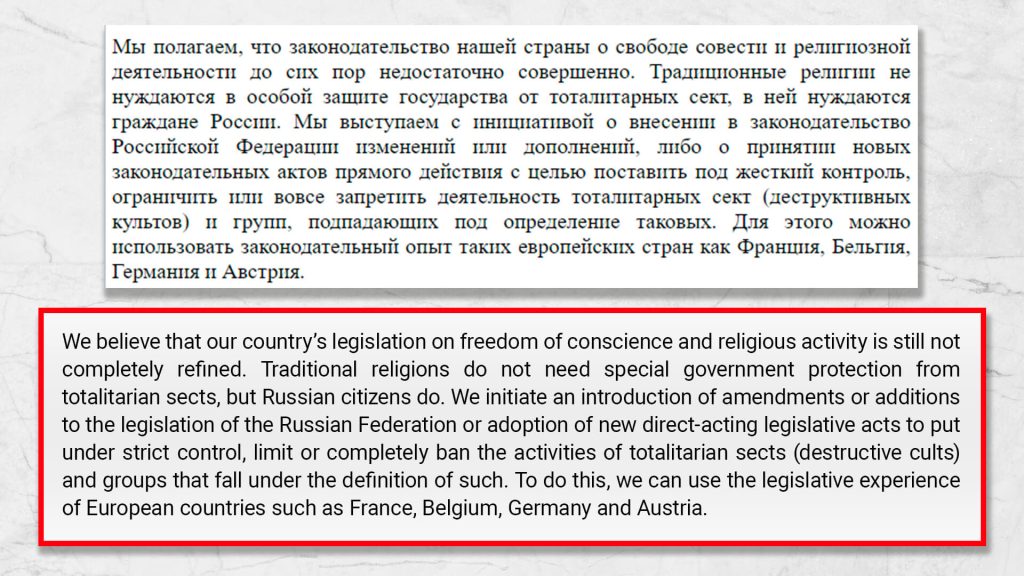
According to the press release, the goal of this conference is to protect Russian citizens and “to introduce changes or additions to Russian legislation or to adopt new legislative acts aimed at putting strict control over, limiting, or even prohibiting the activities of totalitarian sects and groups that fall under such a definition”. The ostensibly noble goals described in the press release turned out to be drastically different from the speeches at the conference itself.
Excerpts from the conference “Totalitarian Sects — A Threat of the 21st Century,” published in the Independent Psychiatric Journal on pages 57-58. Transcript of the speech by Archpriest Dmitry Smirnov.
Source8
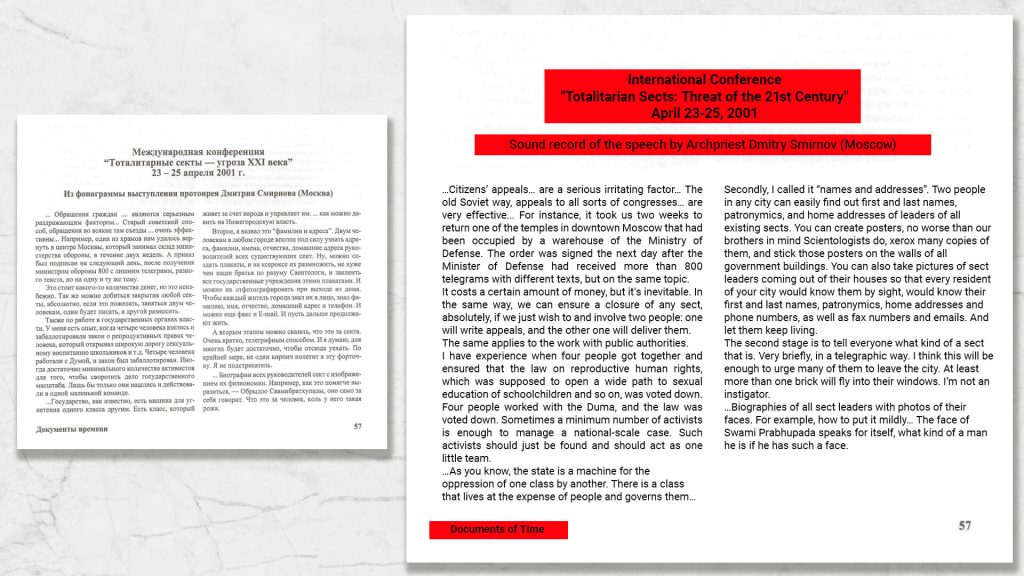
After a preliminary reading of the press release, one expects to see facts, substantiations, objective and unbiased materials, and evidence in the conference itself that confirm the anti-cult rhetoric about the dangers of a particular organization branded as a sect. However, what you actually get is a detailed guide on countering any undesirable organizations with a blatant disregard for all fundamental democratic principles, the presumption of innocence, pluralism of opinions, and all human rights declared at the international level and in the Constitution of the Russian Federation. Even though foreign guests were also participants in the conference. Source9
Another excerpt from the press release of the conference, “Totalitarian Sects — A Threat of the 21st Century” with an incomplete list of participants and countries.
Source10
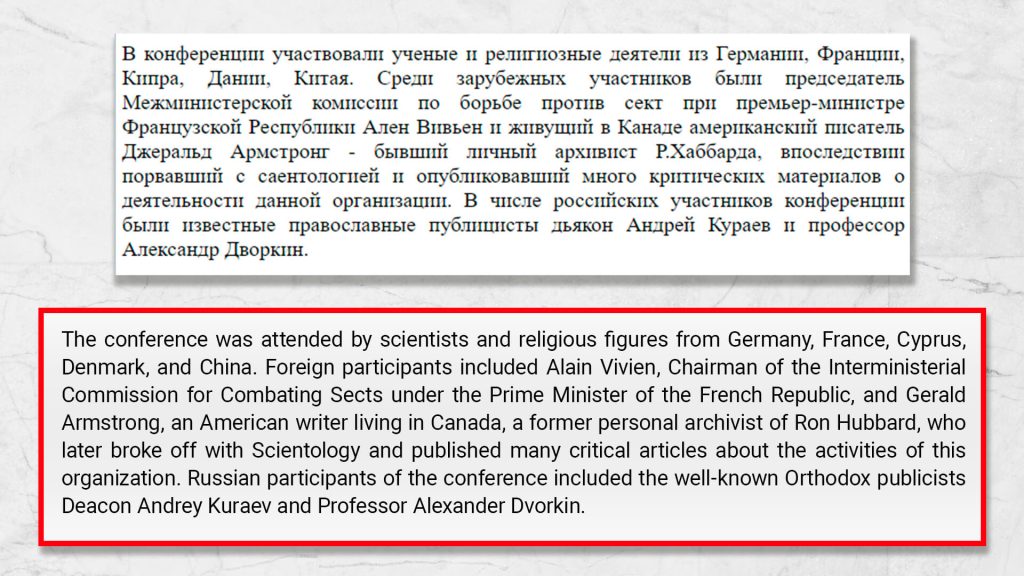
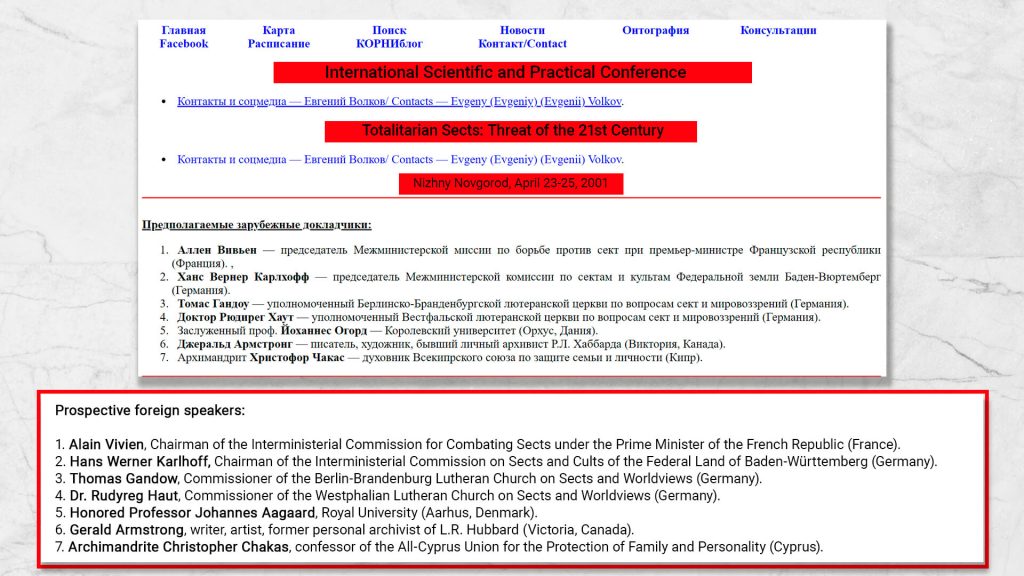
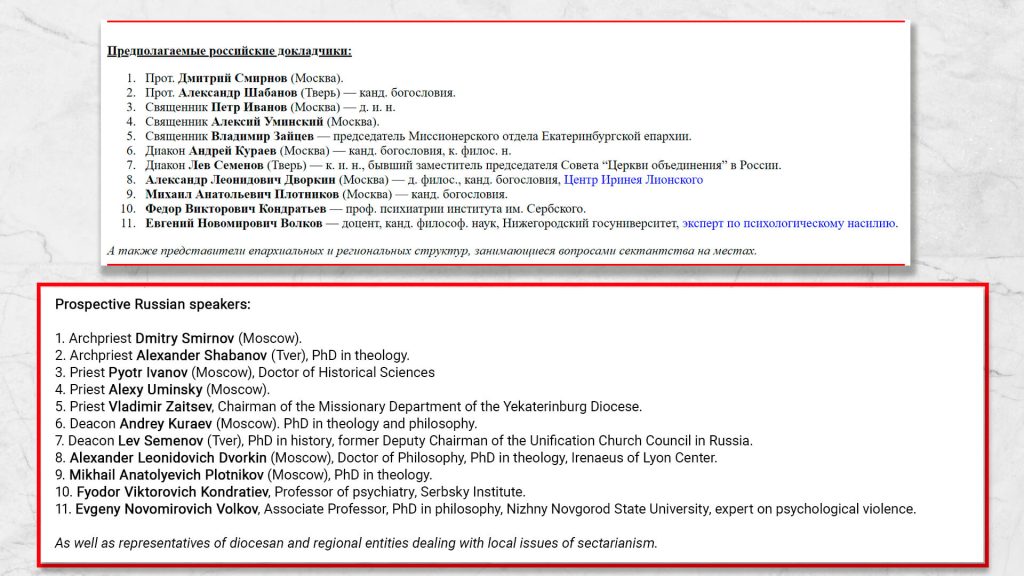
The speech by Archpriest Dmitry Smirnov of the Russian Orthodox Church at the anti-cult conference served as a clear guide on how to use a few individuals to execute a matter of state significance, how to shut down undesirable organizations by first branding them, how to violate the rights of law-abiding citizens, and how to encroach upon their private lives, safety, and mental and physical health to achieve a result where “not a single brick will be thrown in their direction” (Example 1, p. 57). How have we reached a point where those who call themselves followers of Jesus Christ teach not love for one’s neighbor but how to destroy lives and ruin the fates of innocent people?
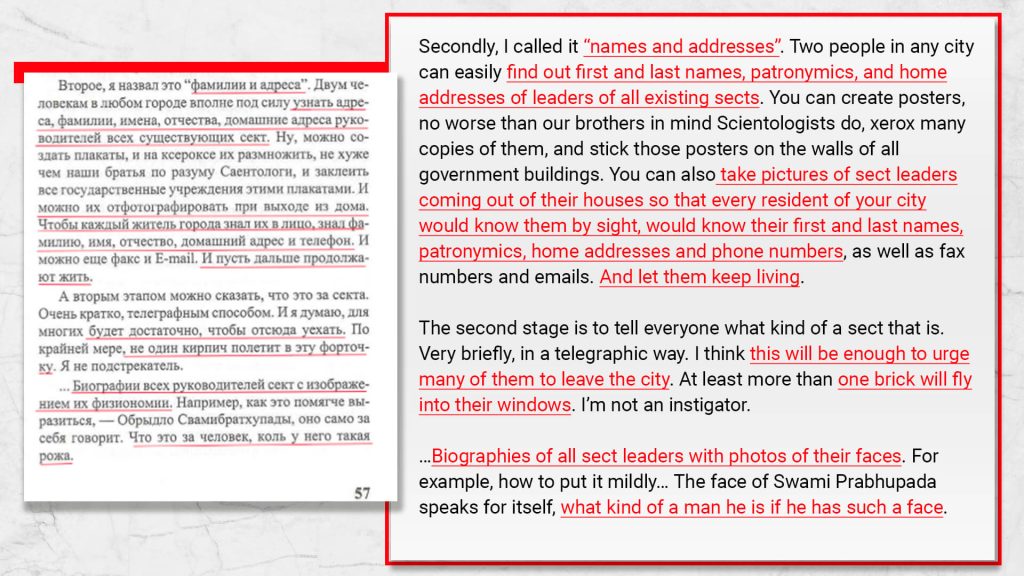
Let us remember what Jesus Christ taught His followers:
“A new commandment I give to you, that you love one another: just as I have loved you, you also are to love one another.” (John 13:34)
“For if you love those who love you, what reward do you have? Do not even the tax collectors do the same?” (Matthew 5:46)
“But I say to you who hear, Love your enemies, do good to those who hate you.” (Luke 6:27)
Another anti-cultist goal is evident in the remark, “for many, it will be enough to leave.” This implies the creation of unbearable living conditions, instigation, and the creation of societal tension, psychological and informational terror, and incitement of hatred, all aimed at forcing members of undesirable organizations to move to another city or even another country. I am not afraid to repeat the question posed earlier: what do those who call themselves the direct successors of the apostles, handed down from the first apostles, the disciples of Jesus Christ, teach?
“By this, all people will know that you are my disciples, if you have love for one another.” (John 13:35)
“For if you love those who love you, what reward do you have?” (Matthew 5:46)
Similarly, the modern anti-cultists act just like the persecutors of the early Christians and the anti-cultists of the pre-Christian era: criminals extremely harmful to the state were either executed or exiled under the pretext of purifying the state
Plato, Laws, Book V
735d: Regarding the purification of the state, the matter is as follows: there are many types of purification; some are easier, others more burdensome. The burdensome and best methods could only be established by someone who is both a tyrant and a legislator. A legislator without tyrannical power, when establishing a new state order and laws, must be satisfied with the gentlest methods of purification. The best method is as painful as when one takes such kinds of medicines.
735e: In this method, justice entails fair retribution; retribution ends in death or exile. This is how they usually deal with the greatest, and moreover, incurable criminals who are extremely harmful to the state. Our milder method of purification is as follows: if the impoverished, following their leaders, show a tendency to rise against the wealthy due to a lack of education, this will become a disease that has infiltrated the state.
736: Therefore, they must be sent away, doing so, however, in the most friendly manner and softening their removal by calling it “resettlement.” In any case, every legislator must do this immediately.
Below is the second page of excerpts from the conference (in the journal, p. 58):

Although it was only 2001 and anti-cult organizations were at the beginning of their journey, their global goals and methods of achieving these goals were already clearly visible.
Quote from the speech by Archpriest Smirnov:
“The thing is, we, thank God, were born and raised in an empire, and of course, every Russian person has a normal imperial consciousness.”
Imperial consciousness equals a slave mentality, which is easier to control. Anti-cult organizations found it convenient to start their destructive activities by reviving and expanding Nazism, gradually increasing their sphere of influence. As a result, more than twenty years later, anti-cultists have deeply rooted themselves not only in the ROC but also in the government, the media, and the security forces and continue to implement their plans on a larger scale.
Anti-cultists have been able to provoke a war between two countries, resulting in the deaths of millions of innocent people. The war in Ukraine, its preparation, and the informational impact and manipulations of the anti-cultists are more thoroughly discussed in the documentary “Impact.”
An excerpt on the greatness of Russia and the nuclear button makes a final point in this example. The words of the clergyman are blatant manipulation, playing on patriotism and spirituality, replacing true Christian values and norms of human morality:
“We are used to Russia being big, Russia being strong, Russia being great, that we have plenty of nuclear buttons, that we can destroy the world. Yes, in principle, this is possible. But now, we don’t have people who have the courage to press these buttons. The people have become spiritually shallow. There are no people who would dare to do it. To decide that yes, we can dictate, we can call the shots.”
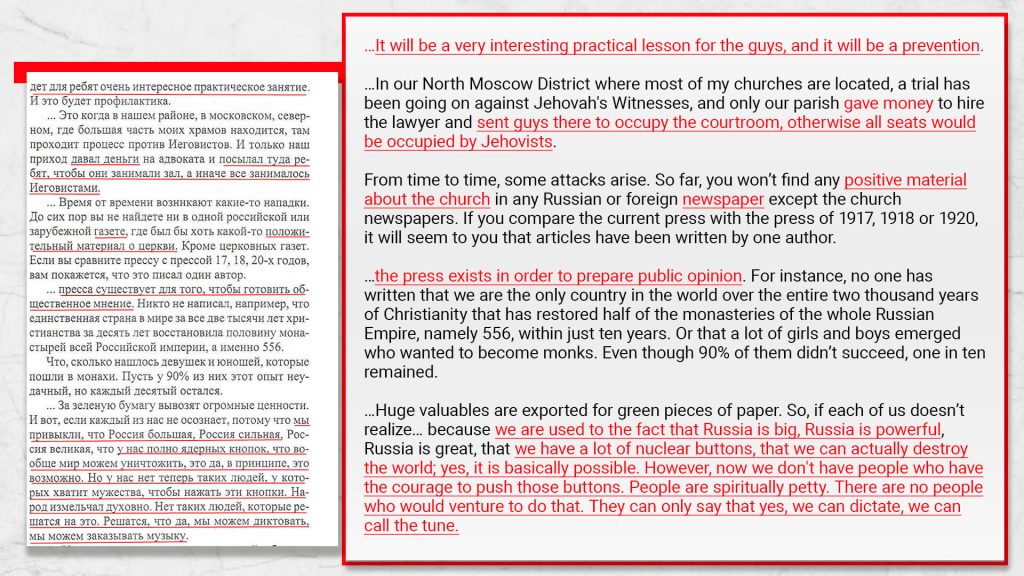
Comments here are unnecessary. Let us recall the teachings of the Son of God:
“These things I command you, that you love one another.” (John 15:17)
“Whoever says he is in the light and hates his brother is still in darkness.” (1 John 2:9)
“You shall love the Lord your God with all your heart and with all your soul and with all your strength and with all your mind, and your neighbor as yourself.” (Luke 10:27)
Over the past 30 years, there has been an increase in church and para-church activities in Russia and neighboring countries aimed at combating sects, inciting inter-religious hatred, and promoting imperialist agendas supported by Old Testament ethics. As evidenced by the speech at the conference “Totalitarian Sects — A Threat of the 21st Century,” there is a deliberate destruction of Christian values, the fundamental teachings of Jesus Christ, the integrity of Orthodoxy, and the fabric of Russia itself. What remains is the facade of the Russian Orthodox Church but with a radically opposite ideology.
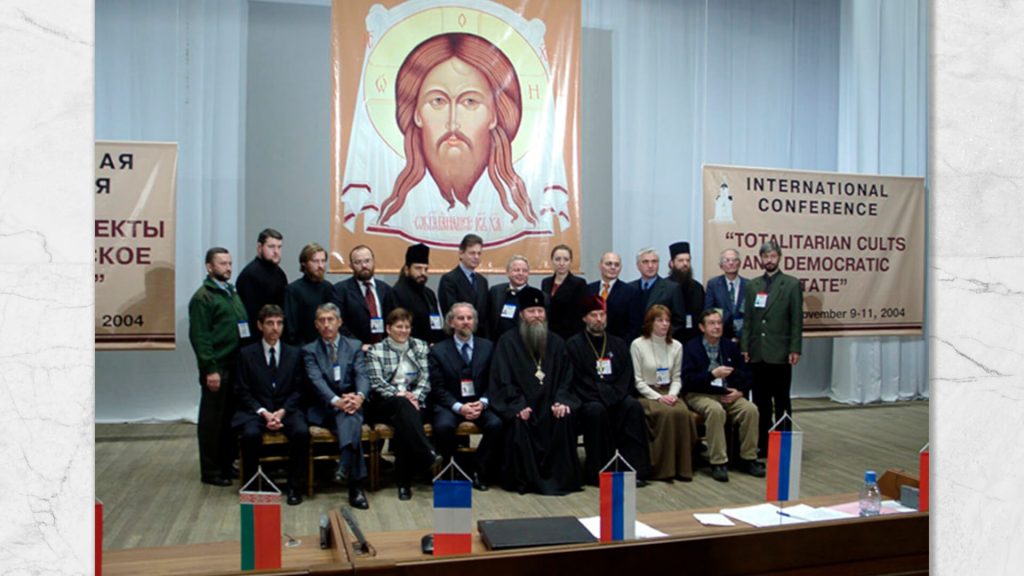
Anti-cultists do not stop at informational propaganda and shaping public opinion; they also directly influence politicians and law enforcement agencies, disrupt events organized by Russian citizens labeled as “sectarians,” engage in slander, defamation, and sometimes outright blackmail.
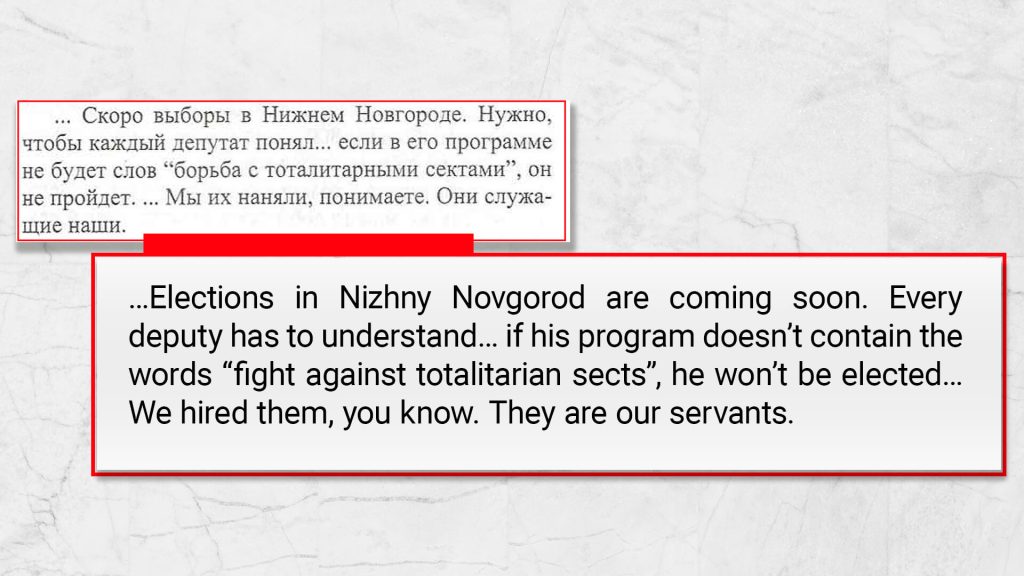
From all the above, one question arises: what has the ROC become today, and what have anti-cultists done to Orthodoxy?
Suppose you think that judging based on one conference is not enough. In that case, we present to you the 2012 publication “Legal Aspects of Countering Totalitarian Sects — 26.03.12” on the website of the Center for Religious Studies in the name of Hieromartyr Irenaeus of Lyon, whose president is Alexander Dvorkin (this center was mentioned earlier in the article).
Source11
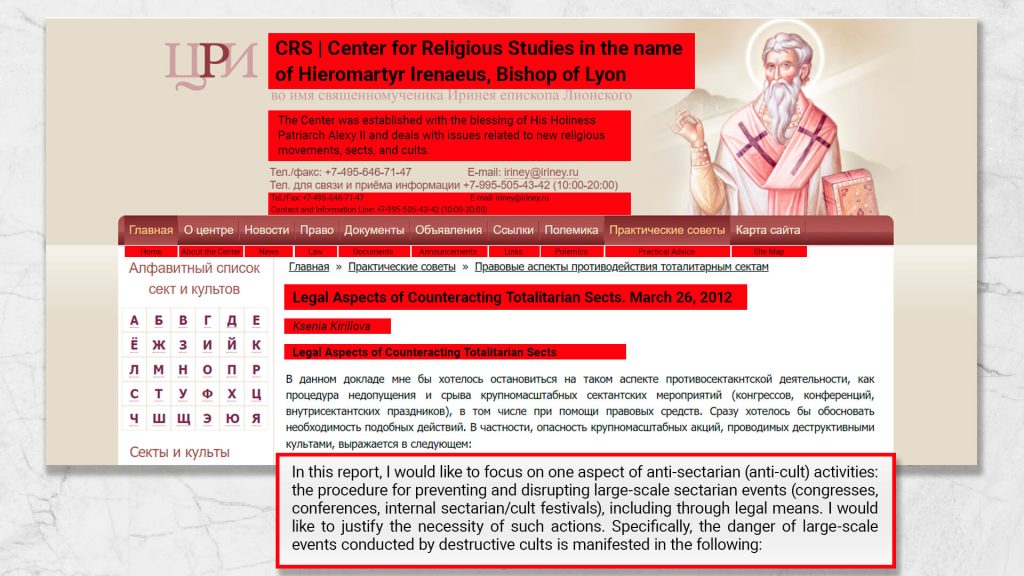
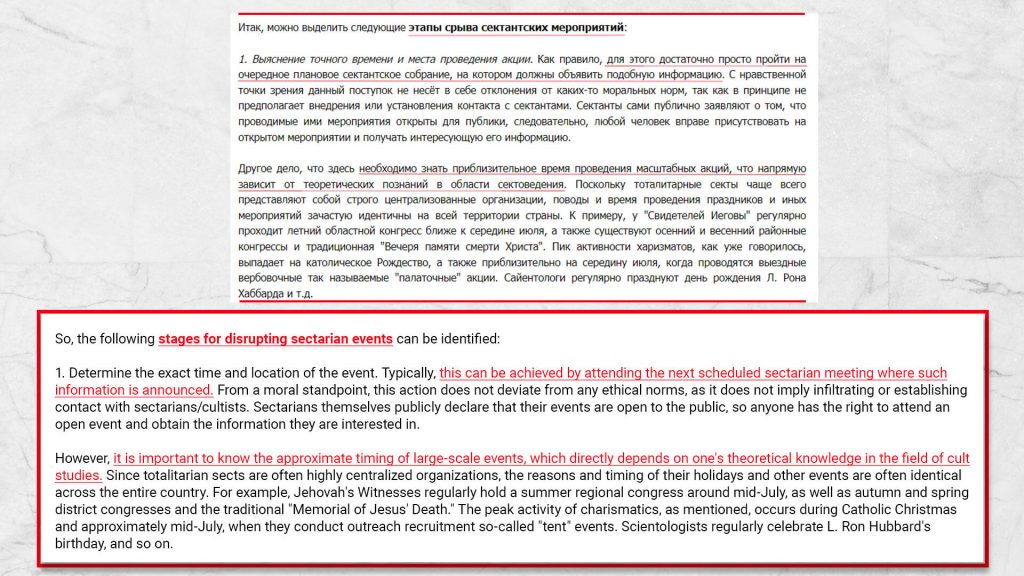
“…it is enough to simply attend the next scheduled sectarian meeting where such information should be announced.“
This publication’s information essentially confirms Archpriest Dmitry Smirnov’s words, spoken 11 years earlier but now in practice. The new generation, raised in youth church organizations, has grown up; the informational processing of the imperial consciousness is complete; the replacement of Christian values has been achieved. Now, a practical action guide has become relevant for new anti-cult fighters.
From the 2001 transcript of Archpriest Dmitry Smirnov (the complete example is given in the article above):
“It is necessary to create a youth organization in each parish.“
“…creating organizations where there will be sports, where there will be some intrigue, where these guys can be sent as scouts into sects to find out addresses, names, photos, so they can create their own structures inside, and blow these sects up from within.“
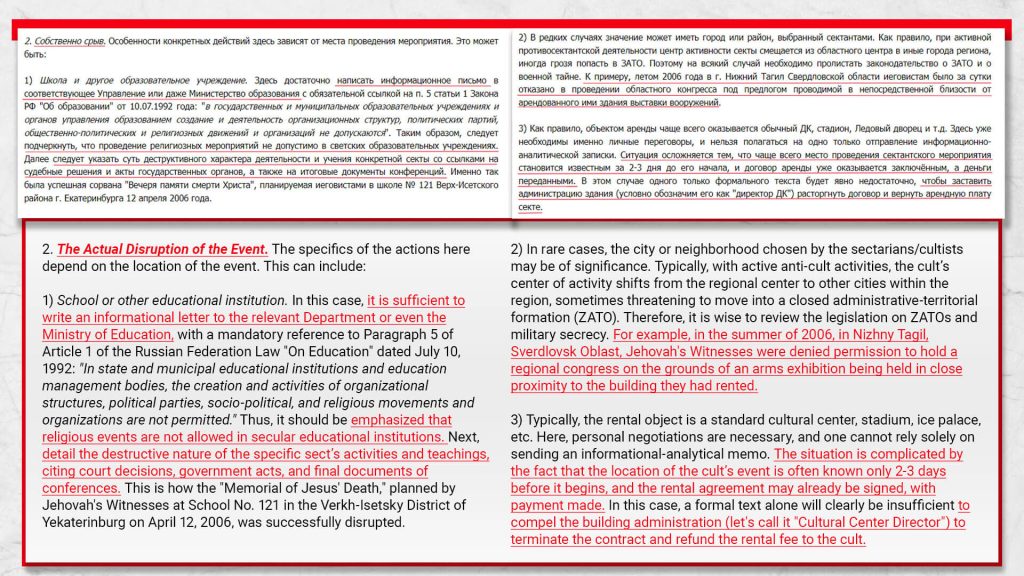
“…to force the building administration…” — that is, not to “convince,” not to “explain,” not to “argue,” but precisely to “force.” Who are the anti-cultists if they believe they have the right to dictate to anyone? Or, to put it another way, who stands behind them?
I would like to highlight another excerpt from the above passage:
“Next, the destructive nature of the activities and teachings of a particular sect should be indicated, with references to court decisions and acts of state bodies, as well as to the final documents of conferences.” Today, court decisions regarding various organizations are based on religious studies expertise.
In Russia, religious studies expertise is carried out by the Expert Council for Conducting State Religious Studies Expertise under the Ministry of Justice of the Russian Federation. Since 2009, this Expert Council has been headed by Alexander Dvorkin, the chief anti-cultist of Russia. The composition of the Expert Council has also been filled with anti-cult representatives since 2009, some of whom are direct members of RACIRS.
In addition to religious studies expertise, court decisions rely on corresponding thematic literature. In Russia, such literature includes the works of Alexander Dvorkin and his associates, which use terms like “totalitarian sects” and “destructive cults.” The expert opinions of professional religious scholars, who are genuinely competent in the matter of New Religious Movements but do not align with the unified line of the ROC, are not considered. Similarly, the final documents of the conferences are equally biased, as these conferences are attended by the same anti-cultists or their accomplices.
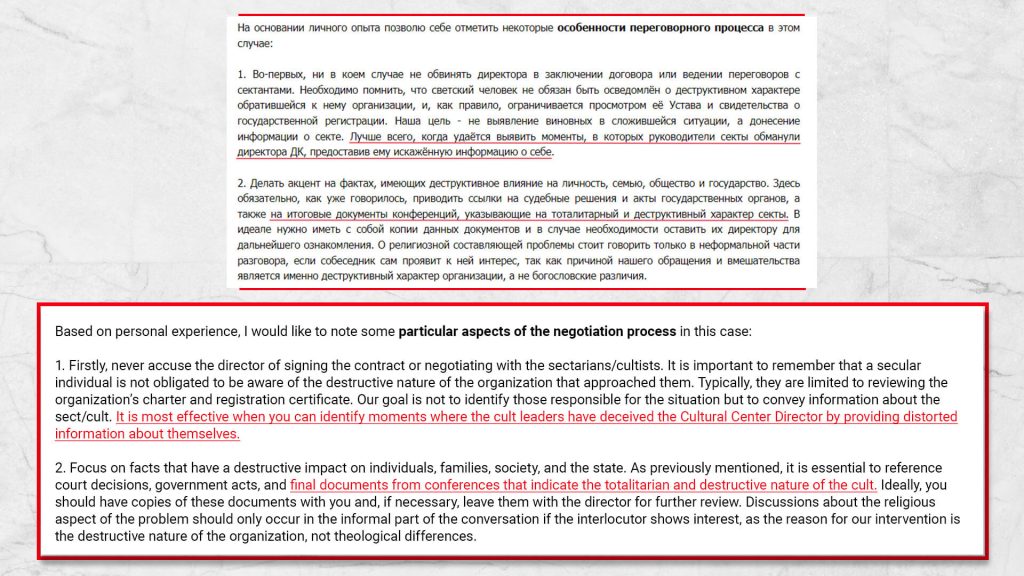
“Better yet, when it is possible to identify instances where the leaders of the sect deceived the director of the cultural center by providing him with distorted information about themselves.” — Considering this remark and being aware of the public speeches of Alexander Dvorkin or Alexander Novopashin, it becomes clear that from the anti-cultists perspective, any information provided directly by the organizations they have branded will be deemed false and distorted. Regardless of the actual objective situation, anti-cult websites invariably attribute the same list of sins and crimes to all organizations included in their “lists of sects.”
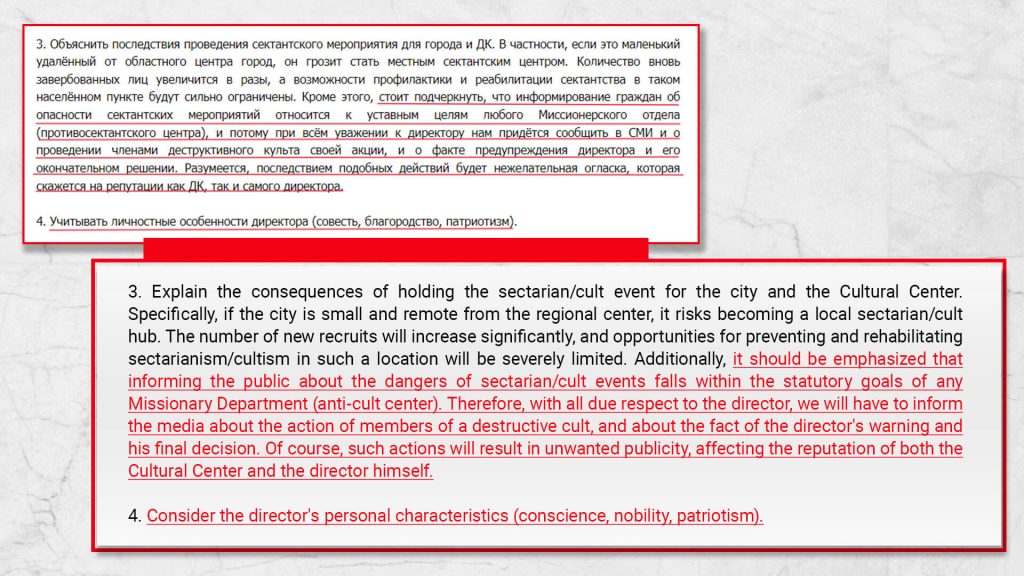
“…with all due respect to the director, we will have to inform the media about the event held by members of the destructive cult, as well as about the warning given to the director and his final decision. Naturally, the consequence of such decisions will be unwanted publicity that will affect the reputation of both the cultural center and the director himself.” — This is clear blackmail and intimidation using public opinion, followed by manipulation of the best qualities of a person (point 4: “consider the personal characteristics of the director (conscience, nobility, patriotism)”), which he can quickly lose in the eyes of society due to anti-cult publications in biased media.
However, if every director subjected to pressure from anti-cultists were not afraid and immediately exposed the manipulation by hidden Nazis, not only would he stop the pressure on himself, but he would also help others, as these destructors would fear acting so unlawfully, blatantly violating the Constitution of the Russian Federation, the next time. If more such cases of exposure occurred, this manipulative method could eventually be practically eliminated. As a result, the public in that city, region, or even the country would breathe more freely, and there would be more justice.
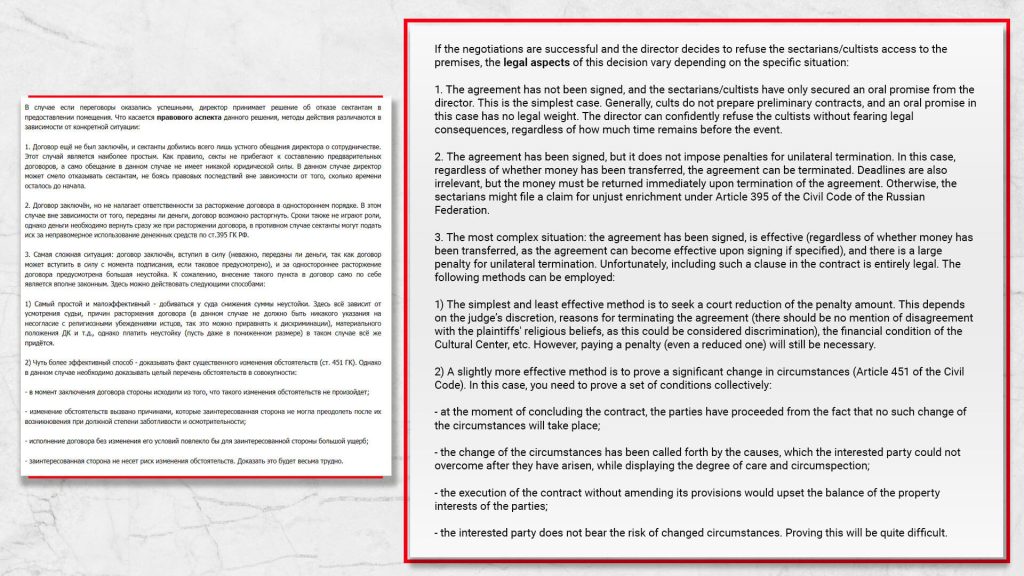
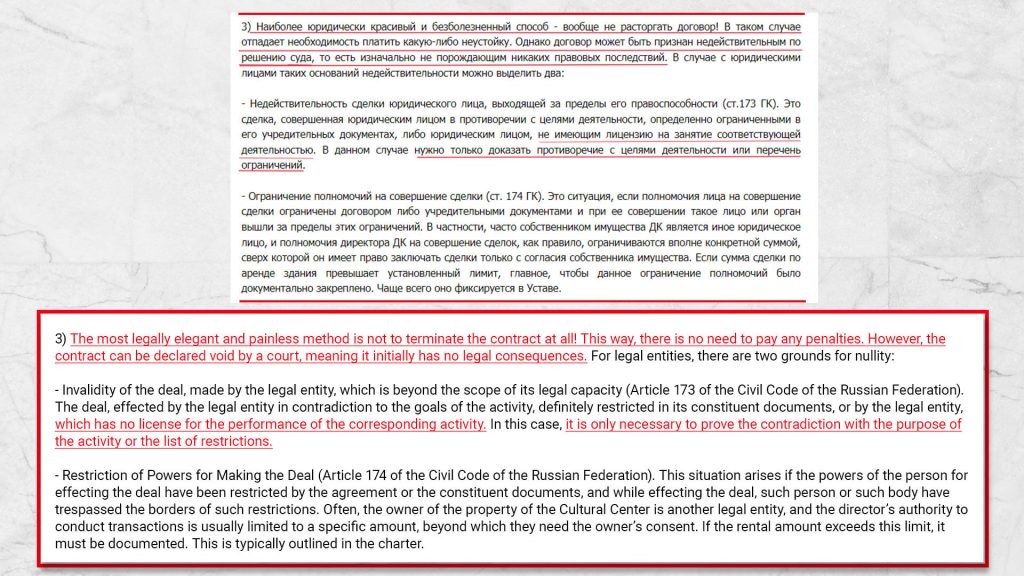
“…the contract may be declared invalid by court decision.” — What can be expected from a court decision in a country where, over the past 30 years, anti-cult agents have infiltrated the government, law enforcement agencies, the media, higher education institutions, and various organizations?
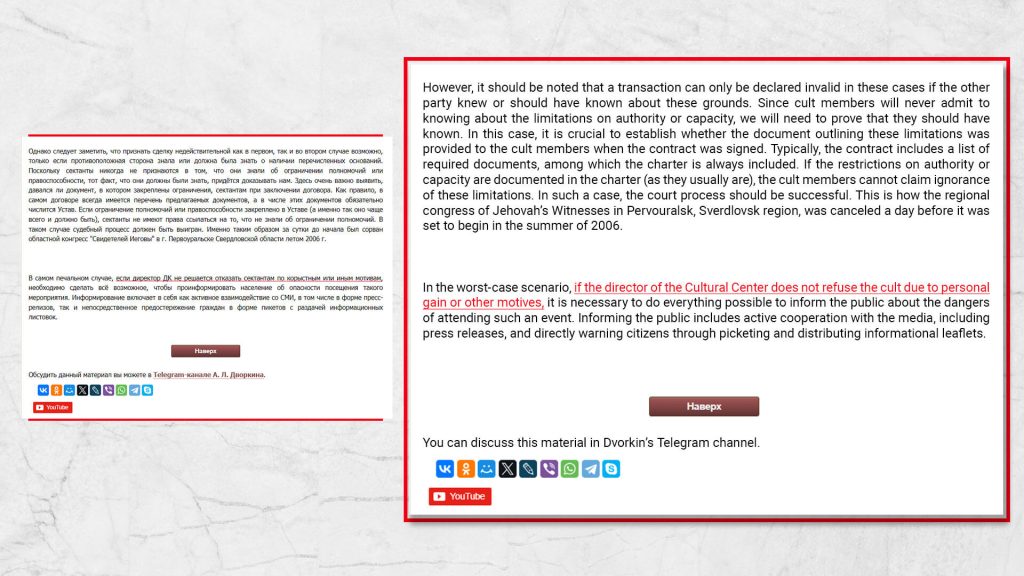
From these examples alone, it becomes clear that anti-cult organizations are not only targeting new religious movements and various organizations to label them as “sects,” but they are also targeting society as a whole. They seek to dictate, impose, blackmail, control, pass judgment, and ruin lives — those are the interests of a person who believes himself to be a god.
Over 30 years, they have successfully dismantled democracy and freedom in Russian society and have transformed what was once the most peaceful religion into a titular militant religion, completely contradicting its essence, calling to kill rather than to love. They have ruined the lives of millions of Russian citizens, and they still have access to the media, educational institutions, and our children. They lack humanity and call for “deprogramming” even their loved ones:
“If any of your relatives, friends, and loved ones have ended up in a sect, and if you, let’s say, work in an organization that deals with these problems… you should be well-versed in these techniques. I would say, in training techniques.” — E.N. Volkov
Source12
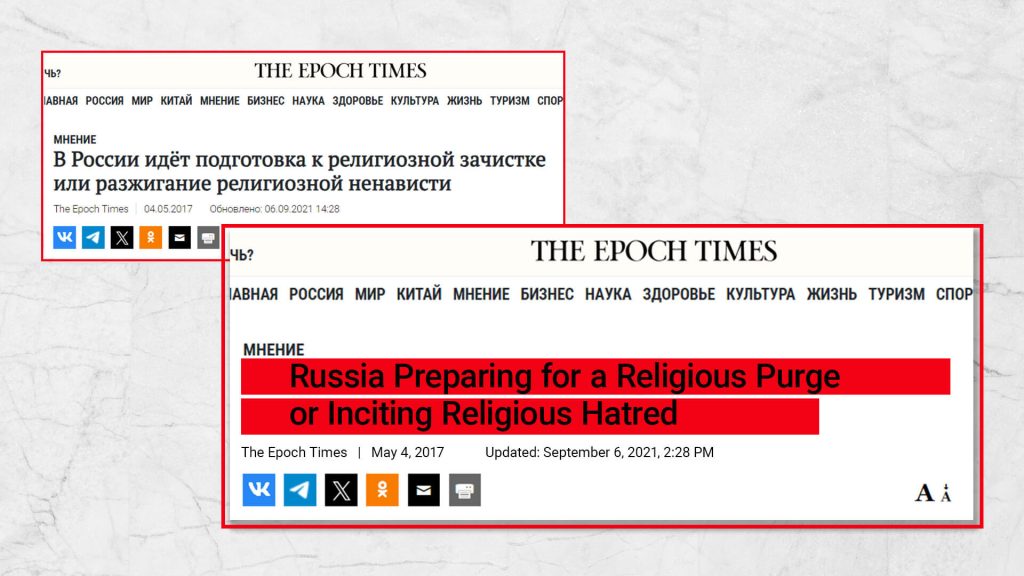
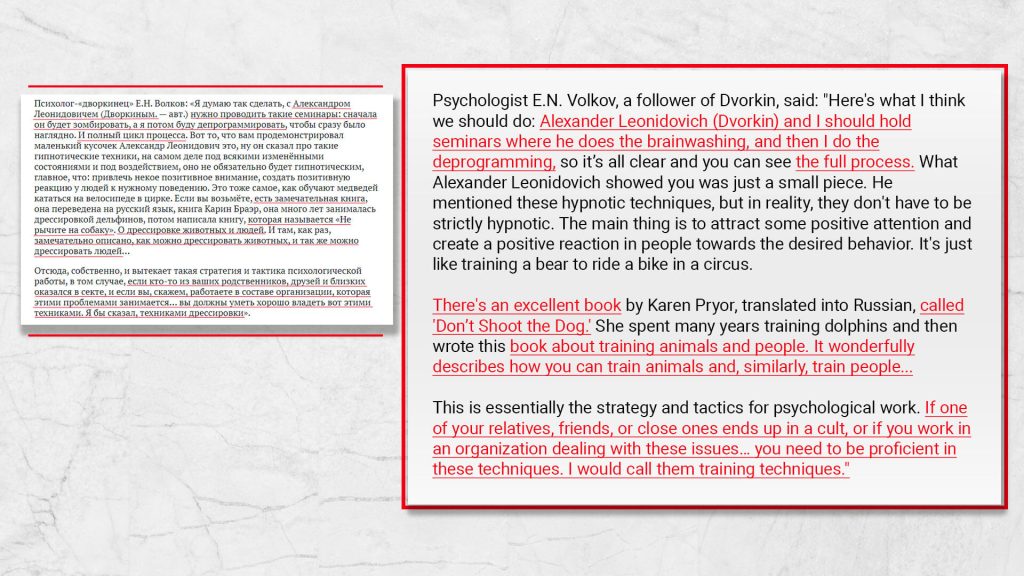
The Church Has Turned Into a Security Agency: Conducting a Covert War
On the website of the Novosibirsk Diocese of the Russian Orthodox Church, led by the aforementioned Archpriest Alexander Novopashin (Vice-President of RACIRS), in the Library section under “Reference Literature,” there is a “Handbook for Ukrainian Citizens on Organizing Resistance to the Kyiv Puppet Government.”
Source13
Upon close examination, it was found that this handbook is also published on the websites of other Orthodox dioceses.
Source14
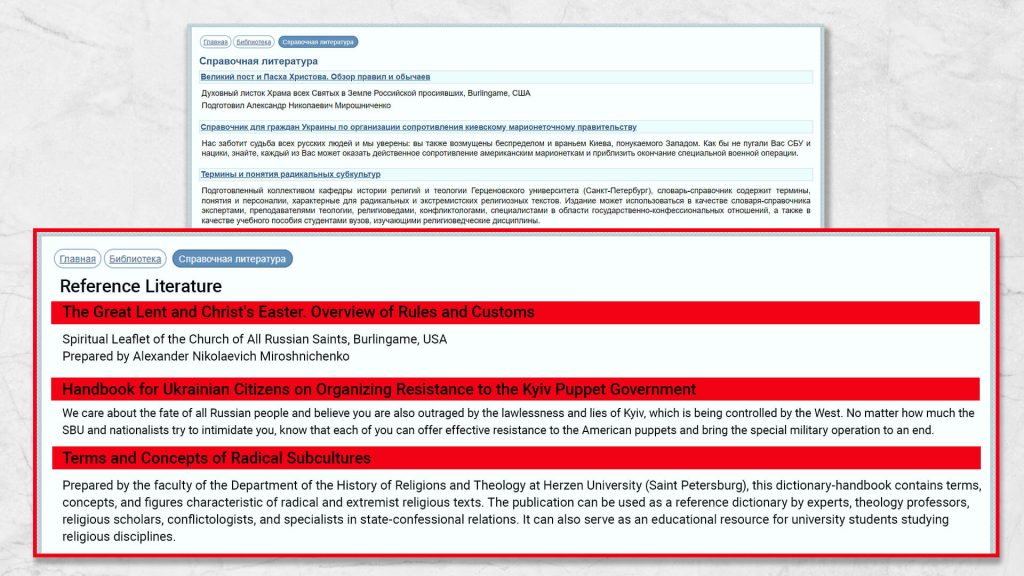
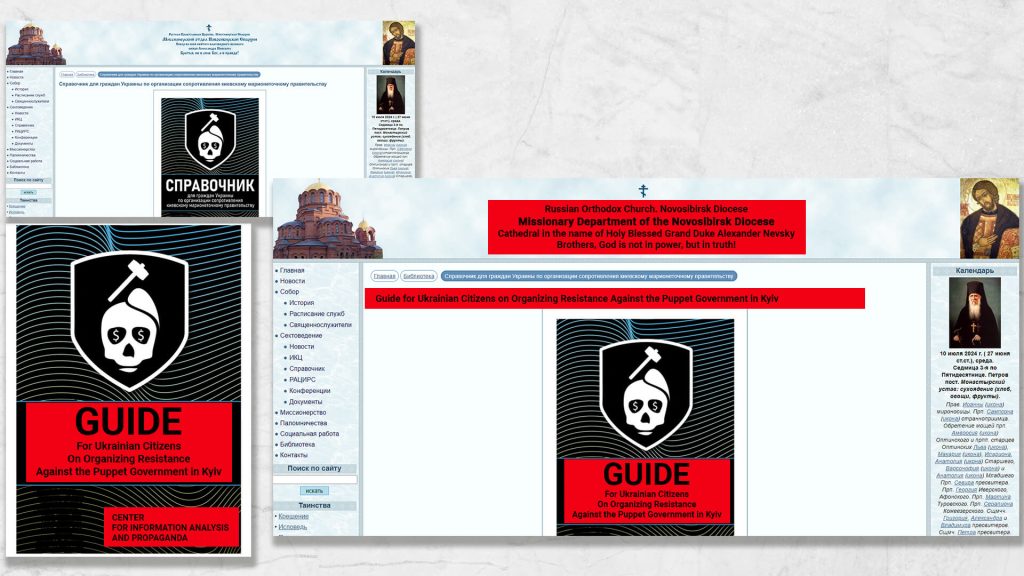
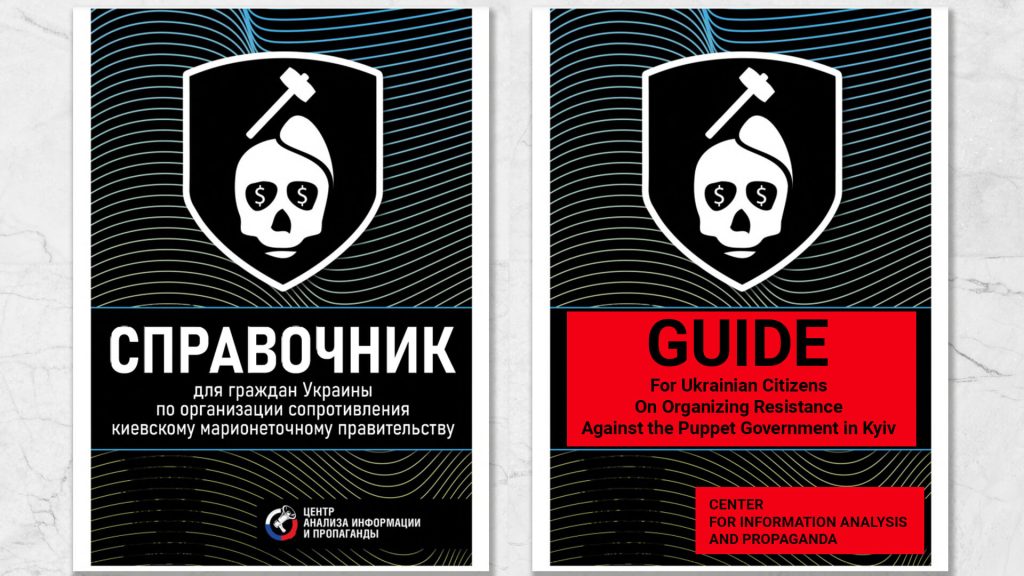
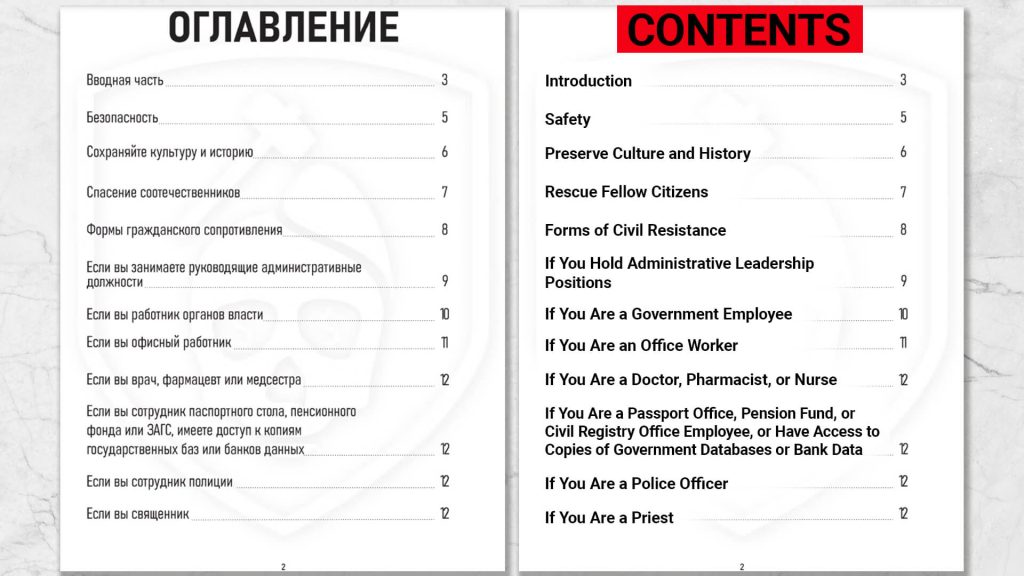
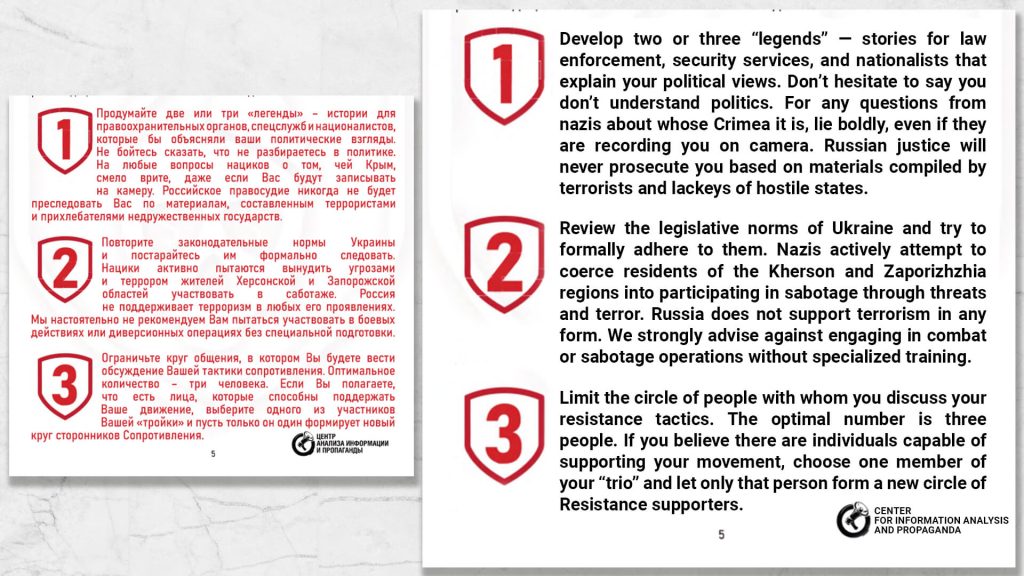
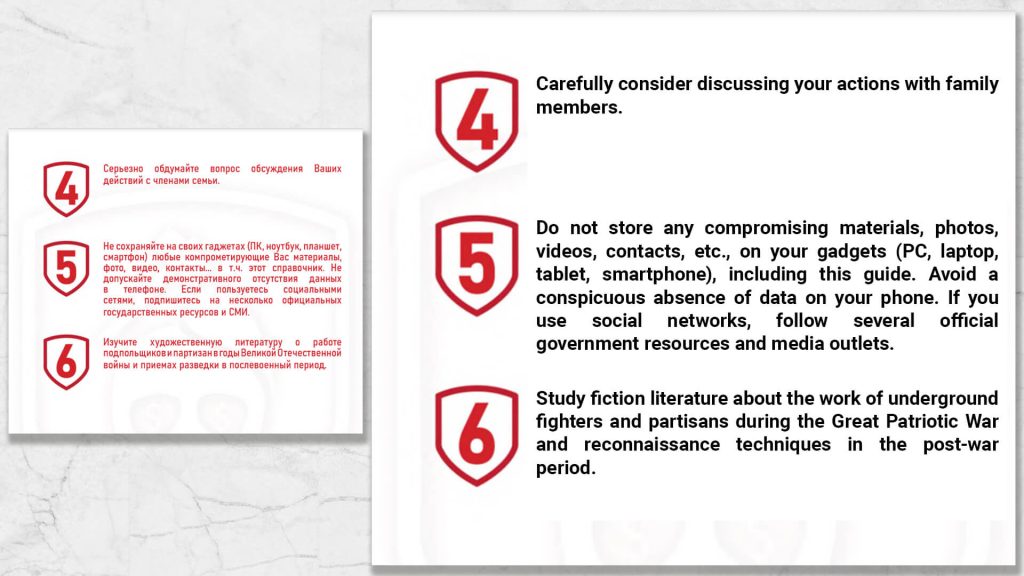
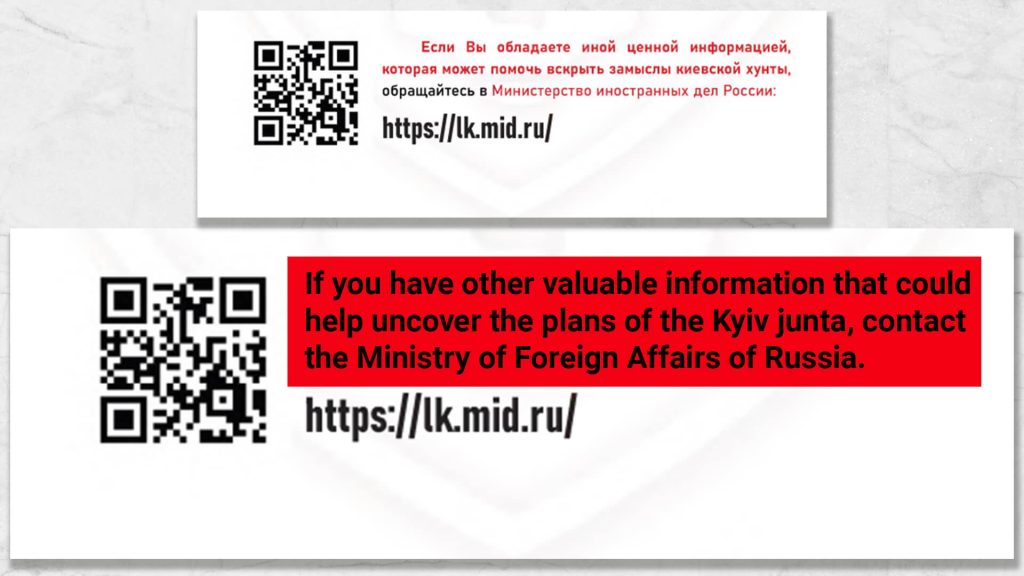
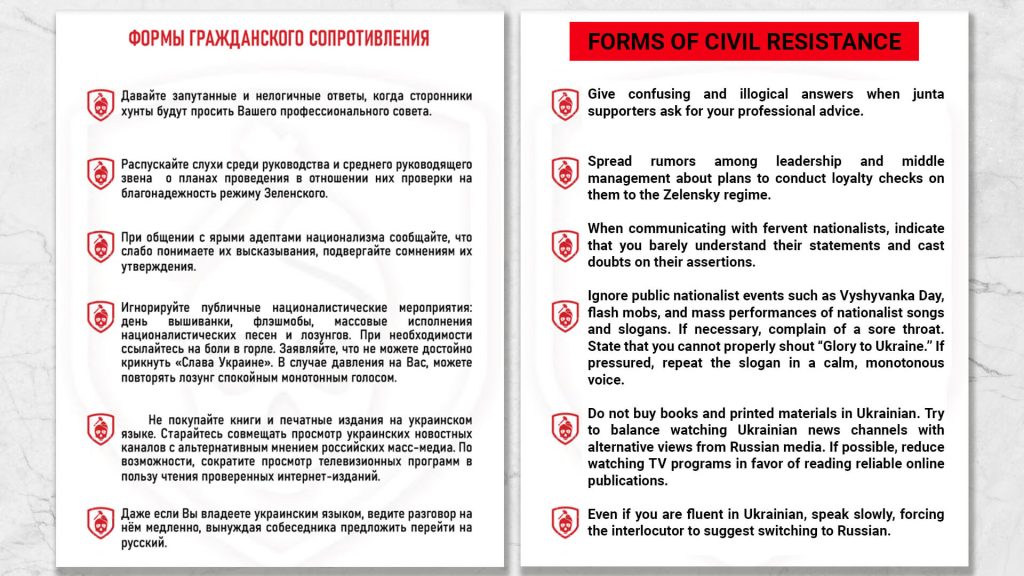
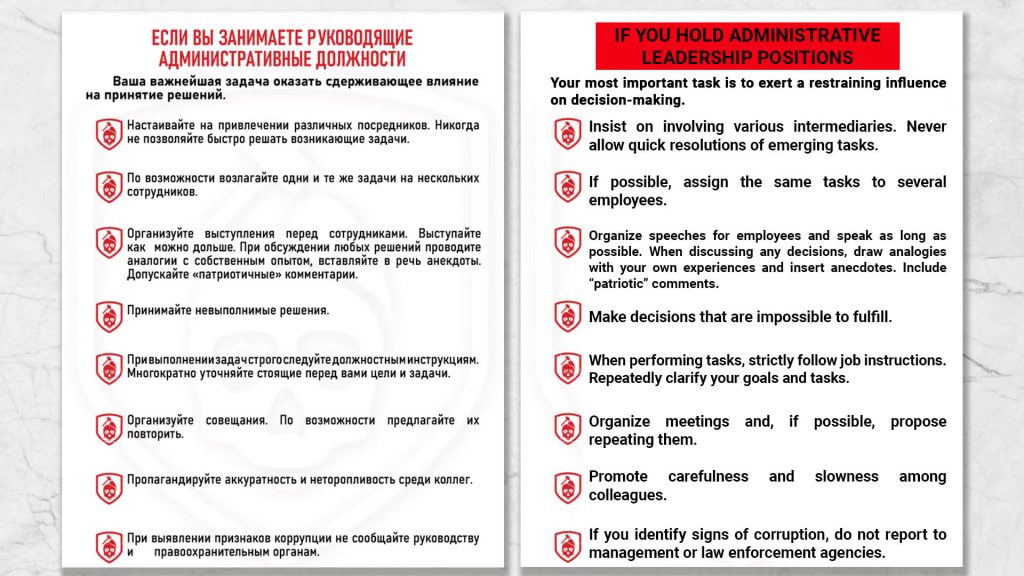
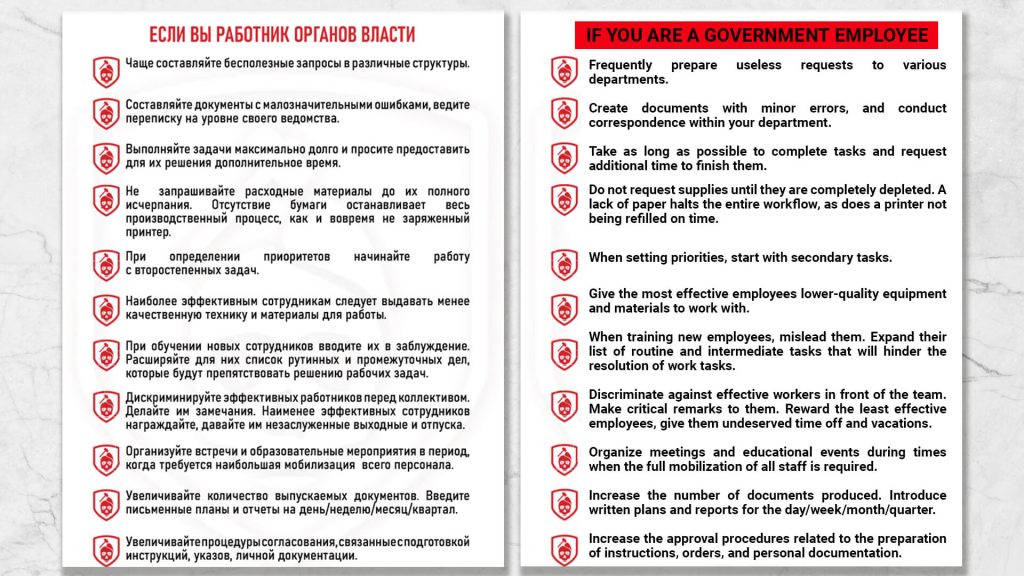
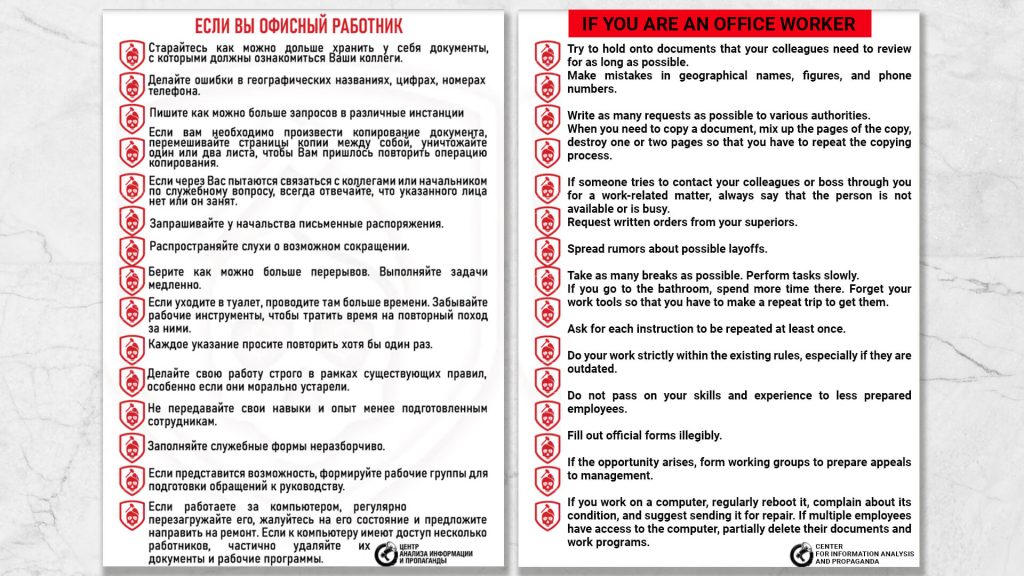
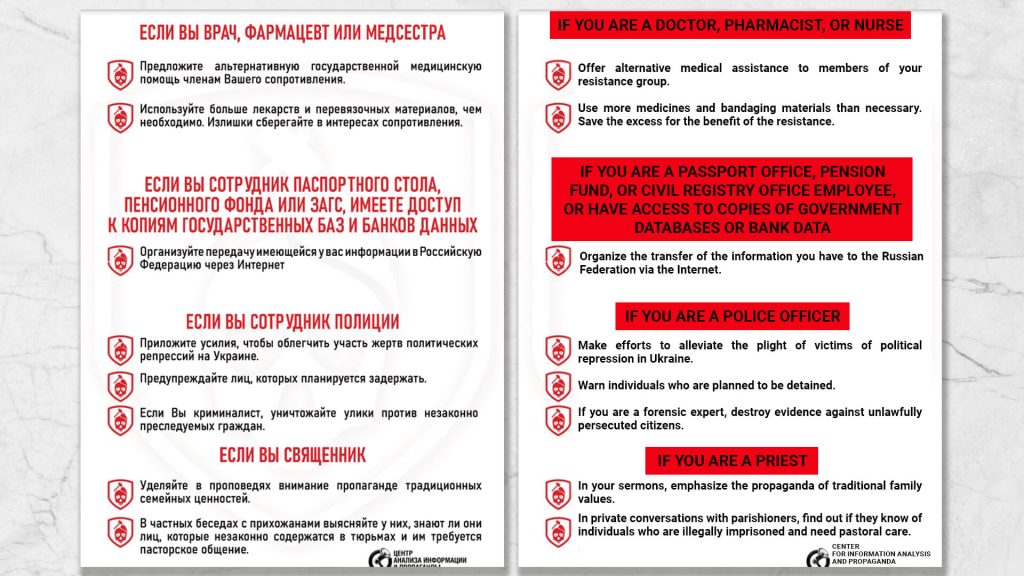
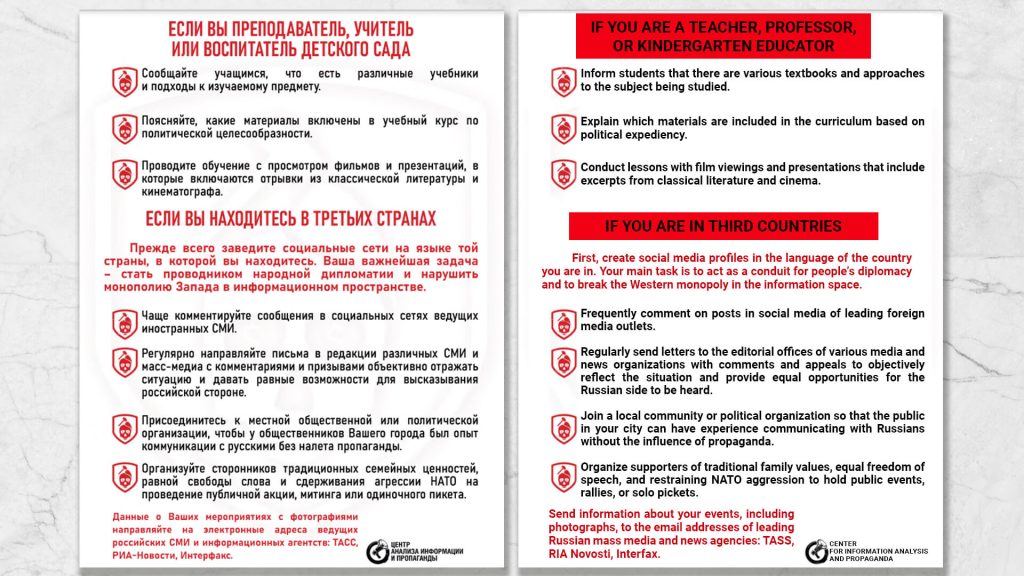
Reading this handbook, one might want to double-check if they are on the right website. It inevitably brings to mind a different Orthodoxy — peaceful, tolerant, humble. The Orthodox Church has always been a refuge for everyone: for some, during moments of hopelessness or despair; for others, in the search for faith and love; for yet others, as a place of solitude and dialogue with God.
But today, on the websites of the Russian Orthodox Church, the Church of Christ (as often heard from the clergy themselves), an instruction on sabotage and conducting covert war is published. The very act of sabotage is a criminal offense, putting Ukrainian citizens at risk. Moreover, this handbook is not just posted anywhere but specifically on the Nizhny Novgorod Orthodox Diocese website. The question arises: where is the Church of Christ that follows the teachings of the Son of God about love and non-violence?
This is far from the only example where anti-cult Nazis openly oppose the teachings of Jesus Christ and drive Him out of the Church.
Anti-Cult Substitutions in Orthodoxy: Old Testament Ethics Over Christ’s Teachings
On the leading Russian Orthodox channel “SPAS” (owned by the Moscow Patriarchate), a series of programs titled “Evening on SPAS” has been airing since 2021. “Evening on SPAS” has become the leading media discussion platform for the Russian Orthodox Church, catering to a vast Orthodox audience from various countries. In one of these episodes, the situation at the front was once again discussed. Among the guests was Evgeny Nikiforov, director of the Orthodox radio station “RADONEZH,” which frequently features interviews with Archpriest Alexander Novopashin (vice-president of RACIRS). Among other things, Evgeny Nikiforov stated the following:
“The disease in Ukraine is so advanced that no persuasion, negotiations, or anything else can cure it; only surgery is possible there. Therefore, the only response to these Nazi demonstrations is ‘Solntsepyok,’ this needs to be burned out completely… Some might say, ‘Oh, this is not the Christian way’ — it is quite Christian! It’s just that the ethics for these people, who position themselves as pagans, excuse me — and they will get treated like pagans. So for you, it’s not New Testament ethics but Old Testament — the ethics of Prophet Elijah, who personally slit the throats of 300 servants of Baal. And with these, it should be the same — to destroy without any doubt. Only Old Testament ethics, or rather, only this language, do they understand.”
Source15
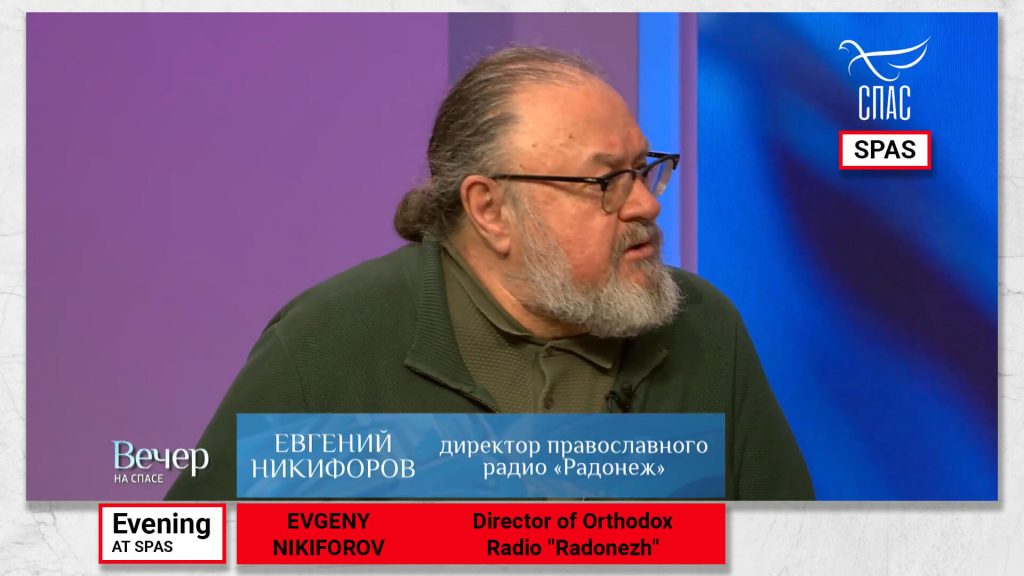
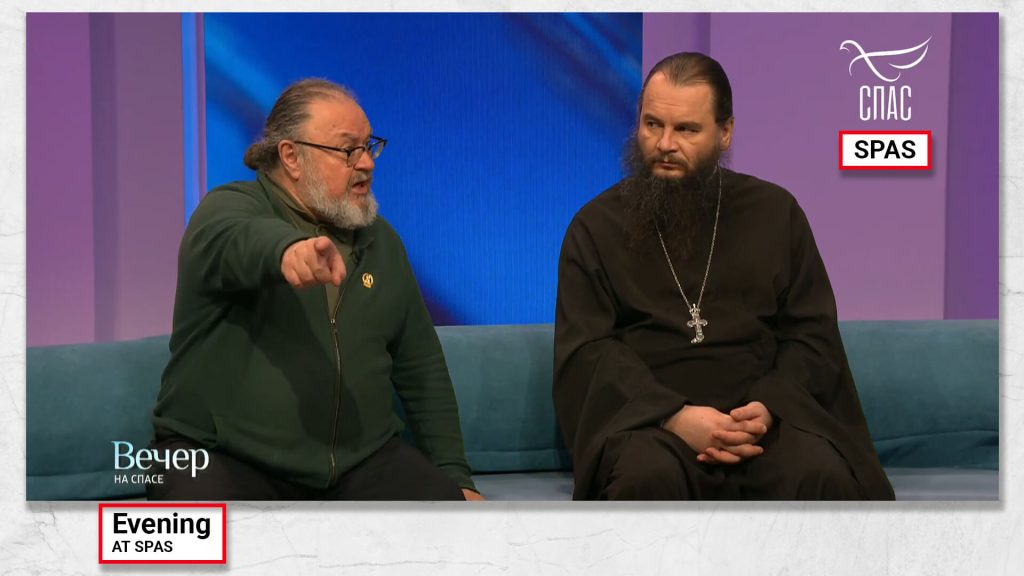
(note: TOS-1A “Solntsepyok” is the most destructive non-nuclear weapon. A single salvo from this type of weapon can annihilate all living things over an area of 40,000 square meters.)


These words were spoken by an Orthodox Christian among other Christians and clergy on the main Orthodox television channel. The essence and foundation of Orthodox teaching is the New Testament. A special place in it is the Sermon on the Mount of Christ. In it, the Savior contrasts the old laws with new covenants of love, peace, and non-violence.
An excerpt from the Sermon on the Mount, Matthew, Chapter 5:
21 “You have heard that it was said to those of old, ‘You shall not murder; and whoever murders will be liable to judgment.’
22 But I say to you that everyone who is angry with his brother will be liable to judgment;
23 So if you are offering your gift at the altar and there remember that your brother has something against you, 24 leave your gift there before the altar and go. First be reconciled to your brother, and then come and offer your gift.”
At that time, the Jewish people were guided by the Mosaic Law, which was laid out in the Old Testament. The Mosaic Law followed the old social order, where regulating public relationships among Israelites was paramount. The Jewish people focused on aspects of retribution, vengeance, power, authority, and hierarchy, which often took precedence over the value of human life.
An excerpt from the Sermon on the Mount, Matthew, Chapter 5:
38 “You have heard that it was said, ‘An eye for an eye and a tooth for a tooth.’
39 But I say to you, do not resist the one who is evil. But if anyone slaps you on the right cheek, turn to him the other also.”
The Sermon on the Mount not only pointed to a new form of peaceful, pious life in society but also opened the path to salvation for every person, regardless of their affiliation to any particular people.
An excerpt from the Sermon on the Mount, Matthew, Chapter 5:
43 “You have heard that it was said, ‘You shall love your neighbor and hate your enemy.’
44 But I say to you, love your enemies and pray for those who persecute you,
45 so that you may be sons of your Father who is in heaven. For he makes his sun rise on the evil and on the good, and sends rain on the just and on the unjust.
46 For if you love those who love you, what reward do you have? Do not even the tax collectors do the same? 47 And if you greet only your brothers, what more are you doing than others? Do not even the Gentiles do the same?
48 You therefore must be perfect, as your heavenly Father is perfect.”
The central truth of Orthodox theology is that Christ is God. One of the dogmas of Orthodox doctrine speaks precisely about the Incarnation. Consequently, the teachings of Jesus Christ not only prevail over the rest of the Bible for Orthodox Christians but also represent the divine revelation in their fullness and purity, requiring neither additions nor changes. The Sermon on the Mount is the covenant of Jesus Christ, the commandments of God, spoken not through prophets but directly by the incarnate God.
If today, through the megaphone of the Orthodox Church, through its main media channel, calls for Old Testament ethics of violence and murder are heard, then who is their god? If they trample on the commandments of Jesus Christ, whom do they serve?
John 8:42-43
42 Jesus said to them, “If God were your Father, you would love me, for I came from God and I am here. I came not of my own accord, but he sent me.
43 Why do you not understand what I say? It is because you cannot bear to hear my word.”
A phrase once read in a book now resonates differently today:
“The departure from Orthodoxy begins when the bright and living common ecclesiastical work of affirming the truth ceases to be common to the whole Church and is declared to be within someone’s exclusive competence.”
— Archpriest Maxim Kozlov, D.P. Ogitsky, Western Christianity: A View from the East: source16
Today, “what is truth” is determined by direct followers of the Nazis. Once, Pilate asked the Savior the same question, “What is truth?” (John 18:38). But he was addressing Jesus. Today, having forgotten God, people turn to one another, relying on each other’s opinions, literature, articles, and expertise. Based on these opinions, they pass judgment, deciding they have the right to control the lives of millions of people as if they were gods. And some even presume to know better than Jesus Christ where God should be:
Alexander Dvorkin:
“You constantly hear the same arguments: ‘God is one, so why do people invent different religions?’ ‘God is in the soul’ – as if, forgive me, God is mold that appears in the soul by itself. I always want to ask this question: ‘From what moment did He appear in you, and how do you actually know that He is there? What are the fruits and what is the name of the God in your soul – do you know this?’ Then it means: ‘God is in the soul, so why go to church?'”
— “Problems of the Mission of the Modern Russian Orthodox Church”
Source17
When you see yet another assertion from an anti-cult Nazi about God that completely contradicts the words of the Savior, you again ask, “Why has the ROC expelled the teachings of Christ from its heart?”
20 Being asked by the Pharisees when the kingdom of God would come, he answered them, “The kingdom of God is not coming in ways that can be observed,
21 nor will they say, ‘Look, here it is!’ or ‘There!’ For behold, the kingdom of God is in the midst of you.” (Luke 17:20-21)
But under the influence of Alexander Dvorkin, the ROC seems to believe that Jesus spoke foolishly, that the Son of God did not speak about the Kingdom of God being within each person, but instead spoke about mold.
The first Christians were supporters and active defenders of freedom, justice, piety, and love. However, for those who have always seen religion as a tool of power, they defended this tool for the possibility of using violence.
Therefore, today, we witness how the cornerstone of what was once a peaceful religion, built on the commandments of Jesus Christ, has become Old Testament ethics, militancy, and calls for murder. But in the hearts of true Orthodox believers, Jesus Christ lives, as does His teaching, even though the heart of the Russian Orthodox Church is afflicted with mold.
Sources:
- www.books.google.de/books/about/Treatise_on_the_Laws.html?id=5qI4DwAAQBAJ&redir_esc=y
- www.platonicfoundation.org/laws/laws-book-10/
- www.npar.ru/wp-content/uploads/2016/02/%E2%84%963_2001.pdf
- www.ansobor.ru/news.php?news_id=11431
- www.newadvent.org/fathers/0305.htm#:~:text=Chapter 2
- www.npar.ru/wp-content/uploads/2016/02/%E2%84%963_2001.pdf
- www.sobj-info.ucoz.ru/publ/1-1-0-4
- www.npar.ru/wp-content/uploads/2016/02/%E2%84%963_2001.pdf
- www.sobj-info.ucoz.ru/publ/1-1-0-4
- www.evolkov.net/cults/confsem/totalit.sects.NN.2001.html
- www.iriney.ru/main/prakticheskie-sovetyi/pravovyie-aspektyi-protivodejstviya-totalitarnyim-sektam.html
- www.epochtimes.ru/content/view/24614/9/?utm_referrer=https%3A%2F%2Fwww.google.com%2F
- www.ansobor.ru/library.php?book=85
- www.ansobor.ru/userfiles/files/library/pdf/Spravochnik.pdf
- https://spastv.ru/mitropolit-pavel-iz-pod-aresta-ne-uhodite-iz-lavry-ne-otrekajtes-ot-hrista-molitva-za-geroya-rossiya-proshhaetsya-s-vladlenom-tatarskim/
- www.azbyka.ru/otechnik/bogoslovie/zapadnoe-hristianstvo-vzgljad-s-vostoka
- www.grad-petrov.ru/broadcast/problemy-missii-sovremennoj-russkoj/


